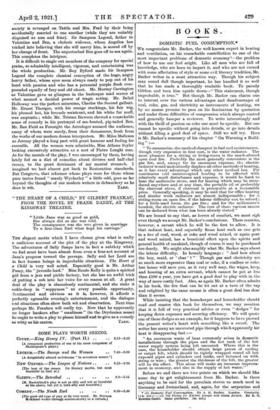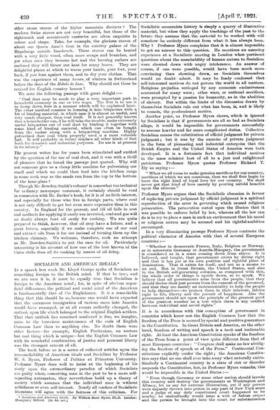BOOKS.
DOMESTIC FUEL CONSUMPTION.* WE congratulate Mr. Barker, the well-known expert in heating and ventilation, on his remarkable contribution to one of the
most important problems of domestic economy1—the problem
of how to use our fuel aright. Like all men who are full of knowledge, who are keen to impart it, and who are not cursed with some affectation of style or some evil literary tradition, Mr. Barker writes in a most attractive way. Though his subject may sound dull though important, he has handled it so well that he has made a thoroughly readable book. To parody Gibbon and turn him upside down—" This statement, though improbable, is true." But though Mr. Barker can charm one to interest over the various advantages and disadvantages of coal, coke, gas, and electricity as instruments of heating, we by no means promise to pass on his fascination by quotation and under those difficulties of compression which always control and generally hamper a reviewer. To write interestingly and with the thrill of passion on coke one must be specific. But one cannot be specific without going into details, or go into details without filling a good deal of space. Still we will try. Here
is Mr. Barker's summary of his chapter " On Warming a Build- ing ,, " To summarize, the method cheapest in fuel and maintenance, though very expensive in first cost, is the water radiator. The most pleasant for a sitting or living-room is the much-abused open coal fire. Probably the most generally convenient is the gas fire, and, except for its enormous expense, the electric radiator would undoubtedly displace all other methods of heating, as it has every advantage which any other method has. For continuous and uninterrupted heating to be effected with relatively small disturbance and expense, it would be hard to beat the anthracite stove, and for heating which may be intro- duced anywhere and at any time, the portable oil or preferably the charcoal stove, if charcoal is procurable at a reasonable price. Generally speaking, it may be said that for office heating and similar work radiators are almost indispensable ; for a sitting-room an open fire, if the labour difficulty can be solved ; for a little-used room, the gas fire ; and for tho millionaire's boudoir, the electric radiator. The cost of these various means can be deduced from what has been already stated."
We are bound to say that, as lovers of comfort, we must sigh
even though we accept Mr. Barker's conclusions. There remains, however, a caveat which he will be the first to allow. It is that radiant heat, and especially flame heat such as one gets in a fire of coal, wood, or coke and wood mixed, or again peat and wood mixed, has a beneficial effect upon the spirits and general health of mankind, though of course it may be purchased too dearly. We might also amplify what Mr. Barker says about the labour difficulty. In homely language : " And how about the boy, maid, or ' char ' 1 " Though gas and electricity are so much more expensive than coal or coke, if a coalless or coke- lees house will save you, as it very well may, the wages, keep, and housing of an extra servant, which cannot be put at less than £100 a year, you have got a good deal to play with in the way of more costly fuel. Also, as again Mr. Barker often admits in his book, the fire that can be let out at a turn of the tap and relighted by the same means is often a great deal less dear than it seems.
While insisting that the housekeeper and householder should read and master this book for themselves, we may mention that it is full of very practical advice or even " dodges " for keeping down expenses and securing efficiency. We will quote one of these dodges as an example, for it happens to have pierced the present writer's heart with something like a sword. The writer has many an uncovered pipe through which apparently hie heat is disappearing fast :—
" An enormous waste of heat commonly arises in domestic installations through the pipes and the hot tank of the hot water supply system being left uncoated. Where this is the case, the householder should obtain large pieces of roofing or carpet felt, which should be tightly wrapped round all hot exposed pipes and cylinders and tanks, and fastened on with string or wire ; the greater the thickness of the felt, tho greater will be the effect. This alone will make an immense improve- ment in economy, and also in the supply of hot water."
Before we end there are two points on which we should like some day to get enlightenment from Mr. Barker. Is there anything to be said for the porcelain stoves so much used in Germany and Switzerland, and, again, for the serpentine and
• (1) notassie Fuel Consumption. By A. H. Barker. London : Constable. [1•ls. net.]— (2) Oil Firing for Kitchen Fangs and Shaw lodes. by It. 0, Bowden-bmith. Same publisher. its. net.] other stone stoves of the higher mountain districts ? The modern Swiss stoves are not -very beautiful, but those of the eighteenth and seventeenth- centuries- are often exquisite in colour and shape. Take, for - example, the glorious stoves of about our Queen Anne's time in the country palace of the Hapsburgs outside Innsbruck.- These stoves can be heated with a very little wood, often mere scraps and branches, and
yet when once they become hot and the burning embers are enclosed they will throw out heat for many hours. They are delightful places at which to warm your hands, your feet, your back, if you lean against them, and to dry your clothes. That
was the experience of many lovers. of winters in Switzerland before the days of the Ileitels de luxe. Why should not these be
revived- for English country houses ?
We note the following passage with- great:delight :-
"Coal dust may be.made. -to play a very important part in household economy in one or. two ways. The first is to use it to damp down fires in a manner which will be explained later. The ether method•consists in forming it into briquettes with a bit of binding material, in which case it is almost as useful, and very much cheaper, than coal itself. It is not generally known that a householder can, if he will take the trouble, make extremely useful briquettes out of coal dust by binding it together- with some kind . of binding material, which can often be bought from the maker along with a briquotting machine. Highly pulverized dust coal when properly used is a most valuable fuel. It will probably in future displace all other kinds of fuel both for domestic and industrial purposes. Its use is at present in its infancy."
Tile present writer has for years been stimulated and excited by the question of the use of coal dust, and it was with a thrill
of pleasure that he found the passage -just quoted. Why will not someone give us a cheap little machine for pulverizing our small coal which we could then feed into the kitchen range in some such way as the sands run from the top to the bottom .
of the hour-glass -?
Though Mr. Bowden-Smith's volume is somewhat too technical : for ordinary newspaper comment, it certainly should be read in connexion with Mr. Barker's book, for it is of no little interest; and especially for those who live in foreign- parts, where coat is not only difficult to get but even more expensive than in this country. In England for the -present, and till oil falls in coat and methods for applying it easily are invented, coal-and gas-will no doubt always beat oil easily for cooking. We are quite.. prepared -to think, however, that oil -may. have a future, and a great future, especially if we make complete use of our coal and extract oils from it for use instead of turning them up the kitchen chimney. We welcome, therefore, such an attempt as. Mr. Bowden-Smith's to put the case- for oil. Particularly interesting is his account of how one of the best known of the. Cairo clubs does all its cooking by means of oil firing.



































 Previous page
Previous page